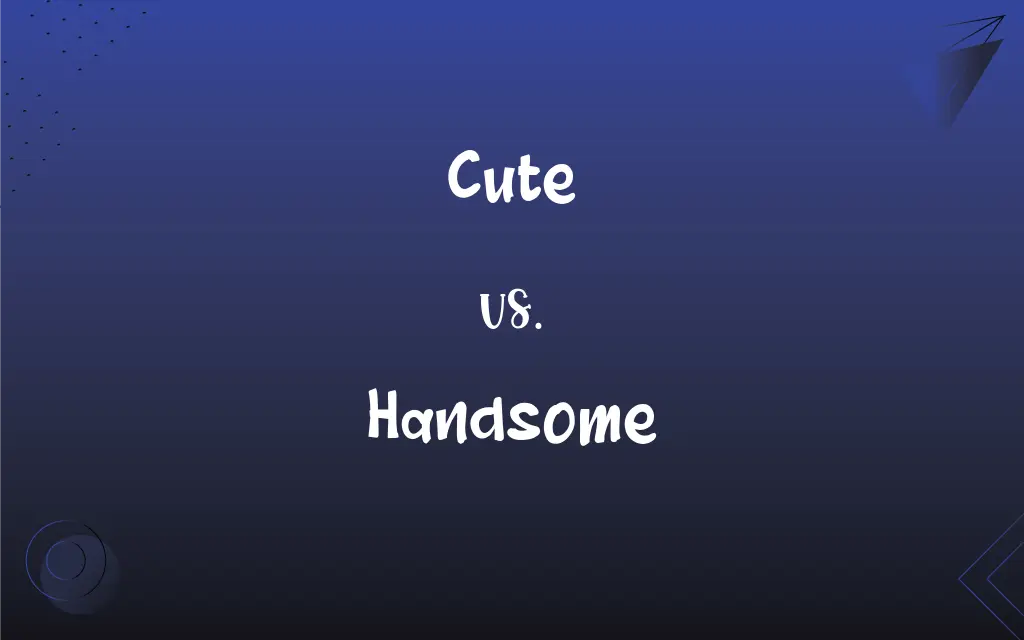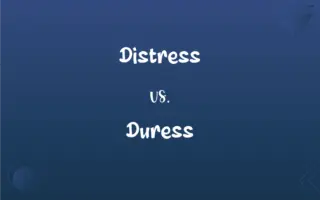Cute vs. Handsome: What's the Difference?
Edited by Janet White || By Harlon Moss || Updated on November 11, 2023
Cute refers to adorable or endearing in appearance or behavior. Handsome refers to attractively dignified or good-looking, especially for men.

Key Differences
Cute often refers to something or someone that is visually appealing in a youthful, charming, or endearing way. It evokes a sense of warmth and affection. Handsome, on the other hand, typically describes a person, especially a man, who is aesthetically pleasing in a more mature, refined, and elegant manner.
When describing animals or inanimate objects, cute implies a small, cuddly, or charming appearance, often eliciting an emotional response. In contrast, handsome is rarely used for animals or objects; it's more commonly reserved for describing a man with striking, classic, and strong features.
In terms of behavior, a person or animal acting in a playful, innocent, or affectionate manner is often labeled as cute. Meanwhile, handsome doesn't usually pertain to behavior, but when it does, it implies a dignified, poised, and confident demeanor.
The perception of cute can be subjective, varying greatly depending on personal taste and cultural influences. Handsome, while also subjective, typically follows more standardized criteria of attractiveness, such as symmetry, proportion, and traditional standards of beauty.
Cute can also imply a degree of vulnerability or the need for protection. Handsome, in contrast, often conveys a sense of strength, independence, and robustness.
ADVERTISEMENT
Comparison Chart
Age Association
Often associated with youthfulness.
Suggests maturity and adult sophistication.
Gender Connotation
Commonly used for both genders but more for females.
Primarily used for males.
Emotional Reaction
Evokes feelings of warmth and protectiveness.
Inspires admiration and respect.
Usage in Context
Broadly used for animals, babies, objects.
Mainly used for adult men, rarely for objects or animals.
Cultural Perception
Varies greatly, often seen as universally appealing.
More standard, aligned with traditional beauty norms.
ADVERTISEMENT
Cute and Handsome Definitions
Cute
Appealing because of innocence or vulnerability.
Her child's cute mispronunciation made everyone smile.
Handsome
Generous or ample (used figuratively).
They made a handsome profit from the sale.
Cute
Designed to be quaint or charming.
The cute coffee shop on the corner is my favorite.
Handsome
Impressively large or substantial.
The company donated a handsome amount to the charity.
Cute
Attractively small or dainty.
The kitten's tiny paws were incredibly cute.
Handsome
Good-looking in a dignified or refined way.
He looked handsome in his well-tailored suit.
Cute
Endearing in behavior or character.
His cute habit of giving compliments brightened her day.
Handsome
Marked by elegance or splendor.
The handsome architecture of the building was awe-inspiring.
Cute
Delightfully pretty or charming.
She wore a cute dress to the party.
Handsome
Having a pleasing and usually impressive or dignified appearance.
The old library had a handsome, classic look.
Cute
Attractive or pretty in a youthful or dainty way
A cute puppy.
A child wearing a cute outfit.
Handsome
Pleasing in form or appearance, especially having strong or distinguished features
A handsome man.
A woman with a handsome face.
Cute
Obviously contrived to charm; precious
"[He] mugs so ferociously he kills the humor—it's an insufferably cute performance" (David Ansen).
Handsome
Having stately or attractive proportions or appearance; impressive
A handsome manor.
A sleek, handsome car.
FAQs
Is "handsome" only applicable to men?
Primarily, yes. It's most commonly used to describe an attractive man, though it can be used for women in a less conventional sense.
Can "cute" and "handsome" be used interchangeably?
No, "cute" often implies endearing or charming qualities, while "handsome" denotes a dignified and attractive appearance.
Can the word "handsome" apply to behavior?
Rarely. It's mostly used for appearance, though it can describe actions metaphorically (e.g., a handsome gesture).
Does "cute" imply weakness?
Not inherently, but it can suggest vulnerability or the need for protection.
Can women be described as "handsome"?
In some contexts, yes, especially when referring to a dignified, striking appearance.
Are there synonyms for "cute"?
Yes, words like adorable, charming, or delightful can be similar.
Is "handsome" subjective?
Yes, like all aesthetic descriptions, it is subject to personal taste.
Can objects be described as "cute"?
Yes, objects, especially small or charming ones, can be described as "cute".
Is "cute" a less serious compliment than "handsome"?
Not necessarily. The seriousness depends on the context and the speaker's intention.
Is "handsome" linked to masculinity?
Yes, it's often associated with masculine beauty standards.
Is "cute" more versatile than "handsome"?
Yes, it can be used in a wider range of contexts and subjects.
Is "handsome" a timeless term?
Yes, it has a classic connotation and has been used consistently over time to denote attractiveness.
Does "cute" vary culturally?
Yes, perceptions of cuteness can vary widely across different cultures.
Can animals be "handsome"?
Yes, but it's more common to describe them as "cute".
Can "cute" be used in a professional context?
It's generally more informal and might not be suitable for all professional settings.
What are synonyms for "handsome"?
Attractive, good-looking, or striking can be considered synonyms.
Can the meanings of "cute" and "handsome" evolve over time?
Yes, like all language, their connotations and uses can change with cultural shifts.
Can "cute" be patronizing?
Depending on the context and tone, it can sometimes be perceived as patronizing.
Does "handsome" imply a certain age?
It often connotes maturity, unlike "cute", which is more associated with youth.
Does "handsome" have a formal connotation?
It can be seen as more formal and serious than "cute".
About Author
Written by
Harlon MossHarlon is a seasoned quality moderator and accomplished content writer for Difference Wiki. An alumnus of the prestigious University of California, he earned his degree in Computer Science. Leveraging his academic background, Harlon brings a meticulous and informed perspective to his work, ensuring content accuracy and excellence.
Edited by
Janet WhiteJanet White has been an esteemed writer and blogger for Difference Wiki. Holding a Master's degree in Science and Medical Journalism from the prestigious Boston University, she has consistently demonstrated her expertise and passion for her field. When she's not immersed in her work, Janet relishes her time exercising, delving into a good book, and cherishing moments with friends and family.































































